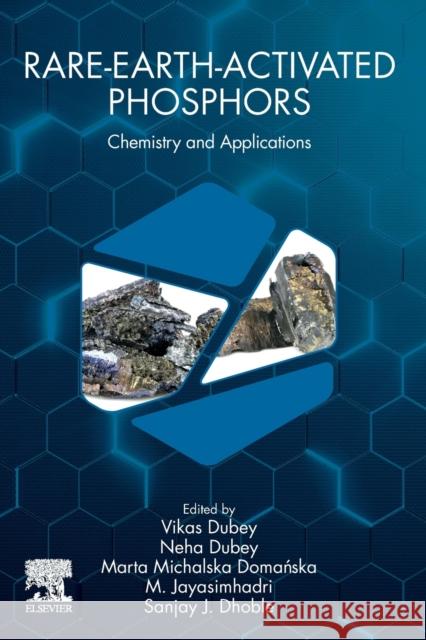Rare-Earth-Activated Phosphors: Chemistry and Applications » książka



Rare-Earth-Activated Phosphors: Chemistry and Applications
ISBN-13: 9780323898560 / Angielski / Miękka / 2022
Rare-Earth-Activated Phosphors: Chemistry and Applications
ISBN-13: 9780323898560 / Angielski / Miękka / 2022
(netto: 723,00 VAT: 5%)
Najniższa cena z 30 dni: 749,87
ok. 16-18 dni roboczych.
Darmowa dostawa!
Part 1: Fundamentals of Rare Earth Activated Phosphors
1. Introduction to Phosphors and Luminescence
2. Rare Earth Activated Phosphors
3. Properties and Characterization of Rare Earth Activated Phosphors
4. Synthesis of Rare Earth Activated Phosphors
5. Degradation of Rare Earth Activated Phosphors
6. Spectroscopy Techniques for Rare Earth Activated Phosphors
7. Defects in Rare-Earth-Doped Inorganic Materials
Part 2: Applications of Rare Earth Activated Phosphors
8. Rare Earth Activated Phosphors for LED Applications
9. Rare Earth Activated Phosphors for Forensic Applications
10. Rare Earth Activated Phosphors for Biomedical Applications
11. Rare Earth Activated Phosphors for TL Dosimetry Applications
12. Up-conversion Luminescence Behaviour of Rare Earth Activated Phosphors
13. Mechanoluminescence Behaviour of Rare Earth Activated Phosphors
14. Rare Earth Activated Phosphors for Energy Efficient Solar Cells
15. Rare Earth Activated Phosphors for Phototherapy
16. Rare Earth Activated Phosphors for Drug Delivery
17. Rare Earth Activated Phosphors for Laser Lighting
18. Persistent Luminescent Behaviour of Rare Earth Activated Phosphors
Dr. Vikas Dubey obtained his Master's degree in Physics from the Govt. V.Y.T.PG. Auto. College Durg, India. He received gold medals for securing first rank in his Master's degree. He completed his PhD from National Institute of Technology Raipur. He is currently working as Sr. Assistant Professor and Asst. Dean of Research & Development in the department of Physics Bhilai Institute of Technology Raipur, India. During the last ten years of his research career, he has published more than 125 research papers in various reputed international journals, with more than 1500 citations. He has published 6 authored books and 10 edited books and several book chapters. He is also editor of various reputed journals and edited numerous special issues.
Govt.V.Y.T.PG. Autonomous College, Durg, India
Neha Dubey is Principal Investigator at Govt.V.Y.T.PG. Autonomous College, where she began work following completion of her PhD at RDVV Jabalpur in 2016. She has co-authored 1 book, 3 book chapters and published more than 20 articles in reputed journals. She is an editorial board member for the journal Advance Physics Letters, and has received awards for her presentations at both national and international conferences.
Dr. Marta Michalska-Domanska graduated in Physical Chemistry at University of Warsaw, completed her PhD at Military University of Technology (MUT, Poland). She took part in the COST project (Action MP 1302) as part of an internship at the University of Tybingen, Germany. She completed her postdoc in corrosion science (AlMagic grant) at TU Delft, Netherlands. She is an expert in the electrochemical synthesis of nanomaterials, especially in the anodization of aluminum and titanium as well as impact of the materials state on its properties. She works in the materials science field and focuses especially on the synthesis and characterization of nanomaterials for photovoltaics, biomedical and spectroscopic applications. She received two awards for her PhD thesis: MUT Rector's Award for distinguished PhD thesis and the Prime Minister Award for the best PhD thesis from all the defended theses in all field in Poland in 2015. In 2016 she received the Scholarship for Young, Outstanding Researchers from the Polish Ministry of Science and Higher Education for her entire academic work. In 2020 she was nominated for "Scientist of Future 2020 by Polish Award of Intelligent Development. She is a member of many international societies, like the International Electrochemical Society or Polish Society of Materials Science. She takes part in many international scientific conferences, also as an Invited and Key Note Speaker. Dr Michalska-Domanska is co-author of more than 30 scientific publications.
Mula Jayasimhadri
Department of Applied Physics, Delhi Technology University, Delhi, India
Mula Jayasimhadri is Assistant Professor in the Department of Applied Physics at Delhi Technology University, India, having previously held positions at Changwon National University and Pohang Univ. of Science and Technology (South Korea) and Sri Venkateswara University (India). He has published over 100 papers in peer-reviewed journals, has presented over 60 papers at international conferences, organized 5 conferences, and won many awards for his work.
Sanjay J. Dhoble is Professor of Physics in Rashtrasant Tukadoji Maharaj Nagpur University, India. His research focuses on the synthesis and characterization of solid state lighting nanomaterials as well as development of radiation dosimetry phosphors using thermoluminescence, mechanoluminescence and lyoluminescence techniques.
1997-2026 DolnySlask.com Agencja Internetowa
KrainaKsiazek.PL - Księgarnia Internetowa









